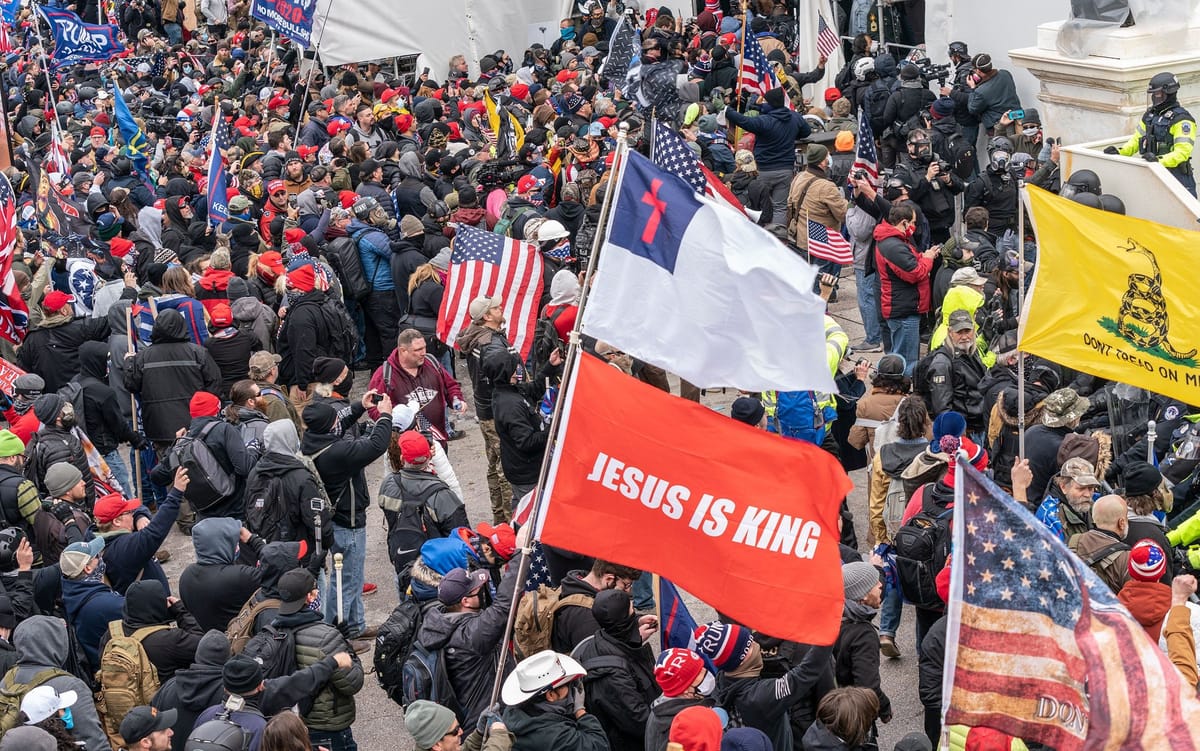Post 7 - When Prophecy Becomes Politics

Resisting fear-based teaching and reclaiming Christ-centered hope
The prophets are speaking—but many are not speaking for God.
In pulpits and livestreams across the nation, self-appointed messengers declare political leaders as “anointed,” claim divine insight into elections, and drape national agendas in the language of heaven. They twist Scripture to fit party platforms, trade repentance for power, and call it revival.
This is not prophetic fire—it is a false flame.
When prophecy is used to excuse corruption, bless nationalism, and baptize conspiracy, we are no longer hearing the voice of the Lamb. We are listening to the dragon in disguise.
God’s true prophets have always called the people to repentance, justice, and faithfulness—not political triumph. They stood against kings, not beside them in exchange for influence.
The Church must wake up. We are being seduced by a counterfeit gospel—one that replaces the cross with a flag, discipleship with fear, and Christ’s return with a quest for dominance.
This is not just bad theology. It is a crisis of allegiance.
And the time to repent is now.
When Prophecy Drives Politics
Today, prophecy is being used to stir fear, justify compromise, and shape national agendas. Consider just a few examples:
- Christian Zionism & Foreign Policy
Some interpret Israel’s political boundaries as prophetic fulfillment, resulting in unconditional support for Israeli military and settlement policies, regardless of justice or human rights concerns. - Mark of the Beast Rhetoric
End-times fears have fueled opposition to digital currency, vaccine mandates, and global health efforts—casting them as signs of the Antichrist’s system. - One-World Government Panic
Some Christians view international cooperation (UN, WHO, climate treaties) as steps toward a satanic “one-world government,” resisting global collaboration out of eschatological paranoia. - Prophetic Endorsements of Politicians
High-profile leaders claimed God had ordained specific politicians to lead—most notably Donald Trump—framing elections as divine tests and refusing to admit prophetic error after failed predictions. - QAnon and Conspiratorial Eschatology
Apocalyptic themes have been absorbed into conspiracy movements, depicting political battles as spiritual warfare, and some leaders as messianic figures in end-times showdowns.
The result? Fear. Division. Moral compromise. Missional paralysis.
This Is Not the Way of Jesus
Biblical prophecy is a call to faithful endurance, not political control. The early Church did not manipulate Revelation to gain influence. They suffered faithfully, witnessing to Christ in the face of empire.
Today, some Christians are trading away the gospel to maintain political power—replacing Jesus’ way of the cross with a culture war wrapped in apocalyptic language.
But Scripture calls us to:
- Live as faithful witnesses (Revelation 2–3)
- Proclaim the gospel to all nations (Matthew 24:14)
- Embody justice, mercy, and humility (Micah 6:8)
- Resist deception and endure hardship (Matthew 24:4–13)
A true, Christ-centered eschatology is not paralyzed by fear but empowered by hope.
False Constructs and Political Idolatry
When prophecy becomes a tool to excuse sin or endorse power-hungry leaders, it ceases to be prophetic—it becomes idolatrous.
Many are now convinced that the Church must defend certain leaders “at all costs,” even when their lives and policies violate the very ethics Jesus taught. This is a betrayal of our first allegiance.
The ends do not justify the means.
The way of Jesus matters.
No prophetic word should be used to excuse what Jesus would condemn.
What the Church Must Do
- Reclaim a healthy hermeneutic
Teach believers how to interpret Scripture wisely, with context, humility, and discernment. - Expose fear-based teaching
Lovingly confront the misuse of prophecy and the culture of fear it produces. - Model prophetic hope
Lead with integrity. Speak with courage. Show the world what it means to hope in Christ, not in power. - Disciple toward maturity
Build up believers who are grounded in truth and resilient in faith, not swayed by emotional manipulation or online sensationalism.
Final Word
Revelation ends not with chaos, but with Christ. Not with fear, but with hope. Not with nationalism, but with the nations gathered in worship before the Lamb.
Let us reject fear-driven faith.
Let us denounce false prophecy.
Let us return to the true gospel.
For the kingdom we belong to is not of this world—and the King we follow does not need political spin.
He reigns already. And He is coming soon.
“Here is a call for the endurance of the saints...”
—Revelation 14:12
Series: Before You Choose a Side: A Christian Guide to War, Israel, and Iran
This post is a part of a series that explores how the Church can live faithfully and missionally in an age of war, nationalism, and prophetic confusion.
- Is Modern Israel the Israel of the Bible?
A Wesleyan-Holiness view of God’s covenant people and the modern state. - What Is Zionism? And Why Does It Matter?
Understanding its political and theological roots—and how Christians often get it wrong. - Why Iran and Israel Are on the Brink
A historical and cultural overview of the conflict from 1979 to today. - The Danger of Dispensationalism
How a popular but flawed theology has distorted Christian responses to war and prophecy. - How Christians Should Think About War
Exploring just war, pacifism, and the call to nonviolence in our tradition. - When Prophecy Becomes Politics
Resisting fear-based eschatology and reclaiming Christ-centered hope.
